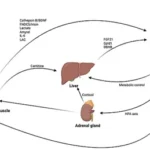A recent study has unveiled intriguing findings regarding the long-term effects of SARS-CoV-2 infection, commonly referred to as “long COVID,” in relation to prior obesity and metabolic health. Conducted by Charles Roberts and his team at Oregon Health & Science University, USA, the research was published in the open-access journal PLOS Pathogens on July 24th. This exploration into the health consequences of viral infections in primates could offer critical insights into human health and the prevalence of long COVID.
Understanding Long COVID and Obesity
Long COVID, also known as post-acute sequelae of COVID (PASC), represents a significant portion of the COVID-19 disease burden. It refers to the persistent symptoms and health issues that can linger well after the initial acute phase of the infection has resolved. Prior research has established that obesity and metabolic disorders worsen the severity of the acute phase of COVID-19. However, there is growing evidence that infection with SARS-CoV-2 can itself trigger new-onset metabolic diseases.
The Study Design
In this study, researchers focused on adult male rhesus macaques, divided into lean and obese groups, to assess the effects of the SARS-CoV-2 delta variant over six months. The animals were monitored for changes in various health parameters after the resolution of the acute infection phase. These included levels of the virus in the respiratory system, viral antibodies, and inflammatory factors in the blood.
Key Findings: Obesity Versus Lean Physiology
The study revealed that many animals continued to show altered health parameters months after overcoming the initial infection. Interestingly, the amounts of virus, antibodies, and inflammatory factors were similar across both lean and obese groups. However, the health responses varied significantly depending on the metabolic status:
– Obese Animals: These animals faced increased risks such as persistent lung damage and prolonged weight loss.
– Lean Animals: Surprisingly, lean animals were more prone to developing signs of metabolic disruption.
A notable finding was the decline in the ratio of adiponectin to leptin in lean animals. This hormonal ratio is a critical marker of metabolic health, and its reduction to levels observed in obese animals suggests a significant impact of the virus on metabolic functions.

(A) Longitudinal changes in body weight in lean and obese animals. Significance determined using mixed-effect analysis with Dunnett’s post-hoc for multiple comparisons test. Data are mean ± SEM. (B) Body weight changes between baseline and 6 months PI. Significance determined by 2-way repeated-measures ANOVA with post-hoc pair-wise comparisons. *, p < 0.05; **, p < 0.01; ****, p < 0.0001.
Implications for Long COVID
The results of the study suggest that long COVID might be more prevalent than indicated by human self-report data, as many long-term effects observed were physiological rather than symptomatic. “Some parameters changed more robustly in obese animals, while others changed more robustly in lean animals,” the authors noted, indicating that persistent effects of SARS-CoV-2 infection are both dependent on and independent of obesity.
Charles Roberts, a professor at Oregon Health & Science University, commented on the findings: “One of the most striking results of our study was the extent of long-term adverse effects seen after what outwardly appeared to be a very mild initial disease course. This suggests that long COVID can indeed result from a mild infection.” He emphasized that some symptoms of long COVID might only become apparent long after the initial infection, correlating with increased levels of inflammatory factors and changes in biomarkers of cardiometabolic disease risk observed six months post-infection.
Future Research Directions
Coauthor Dr. Kristin Sauter highlighted the importance of developing a macaque model of long COVID. This model will enable direct comparisons between the effects of the delta variant and those of later variants, such as omicron, which is currently under investigation with support from the NIH. By ensuring that the macaques used in studies have never been exposed to SARS-CoV-2 previously, researchers can attribute different responses to the variants themselves rather than varying levels of existing immunity, which complicates human studies.
Conclusion
The study underscores the complex and varied impact of SARS-CoV-2 infection based on prior obesity and metabolic status. These findings not only highlight the multifaceted nature of long COVID but also stress the importance of considering metabolic health in the context of viral infections. As researchers continue to explore the implications of these findings, both human and animal studies will be crucial in unraveling the full scope of long COVID and informing public health strategies.
Sauter, K. A., et al. (2025). Effect of obesity on the acute response to SARS-CoV-2 infection and development of post-acute sequelae of COVID-19 (PASC) in nonhuman primates. PLOS Pathogens. doi.org/10.1371/journal.ppat.1012988 IF: 4.9 Q1

